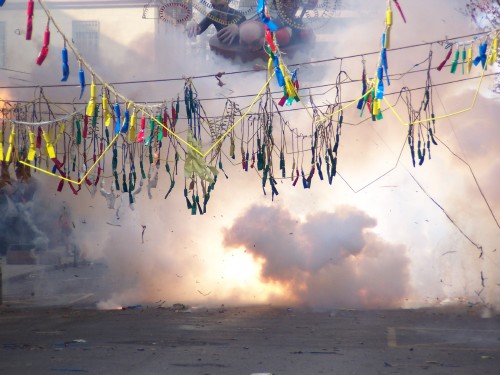Monday, 31 March 2008
Thursday, 13 March 2008
English Academy
- Buenos dias, ¿Puedo ayudarle?
+ Buenos días, ¿Es esto una academia de inglés?
- Uhm! If, if, between, between.
Wednesday, 12 March 2008
Tuesday, 11 March 2008
You say potato, I say ghoughbteighpteau
Harry Bingham on why English rules the world of languages
Start with spelling. George Bernard Shaw once commented that English spelling would allow you to write FISH as GHOTI (f as in rough, i as in women, sh as in nation.) But he couldn't have been trying all that hard, if that was the best he came up with. The fact is that with just 26 letters and 48 different sounds to cope with, there were always going to be problems. Besides the Great Vowel Shift, other pronunciation changes, and an appetite for foreign borrowings, and it's no surprise that English now has some of the most dangerously unpredictable spellings in the world.
With about one and a half billion non-native speakers, English has become the world's own language. Given that there will shortly be as many English language speakers in
If you wanted to learn all the words in the Oxford English Dictionary, you'd have to deal with about 500,000 of them (the last of which is zyxt, a splendid last word by any standards and an archaic Kentish term for thou seest( you see)). Having done that, you'd probably be a bit taken aback to learn that the equivalent American dictionary, Webster's, offers a further 450,000 words or so.
In the cultural realm, however, mere size is hardly likely to impress. In terms of Nobel Prizes for literature, the
Gore wins Nobel Peace Prize for climate campaign

Click here to see the trailer the video in YouTube.
October 12, 2007
Al Gore won the Nobel Peace Prize today for warning the world about the dangers of global warming, and leading the campaign to persuade governments and individuals to reduce their reliance on fossil fuels.
The former
Mr Gore said tonight that climate change is the most “dangerous and urgent challenge” the world faces at the moment and said it is time to “elevate global consciousness” about the challenges of global warming.
“It truly is a planetary emergency and we have to respond quickly.”
With his wife Tipper grinning widely by his side, Mr Gore would not answer any questions after his statement, including whether or not he would run for President.
The prize puts Mr Gore's name on what is perhaps history's most illustrious list, alongside such campaigners for freedom, democracy and human values as Lech Walesa, Aung San Suu Kyi, Mother Teresa and Martin Luther King.
He is not the first environmentalist to win the peace prize, which was given to Wangari Maathai, a Kenyan campaigner for sustainable development, three years ago. The Norwegian Nobel Committee said however that Mr Gore was one of the first politicians to understand the risks of climate change, and described him as "probably the single individual who has done most to create greater worldwide understanding" of the challenge it presents.
He is best known for presenting An Inconvenient Truth, the 2006 documentary laying out the risks of global warming - although a UK High Court judge criticised it this week as "alarmist". The film won this year's Oscar for best documentary.
Welcome
As anybody else, teachers of PALE also use new technology. This is going to be our blog in which I will upload articles, interviews, movies or audio files for you.
Bye...

